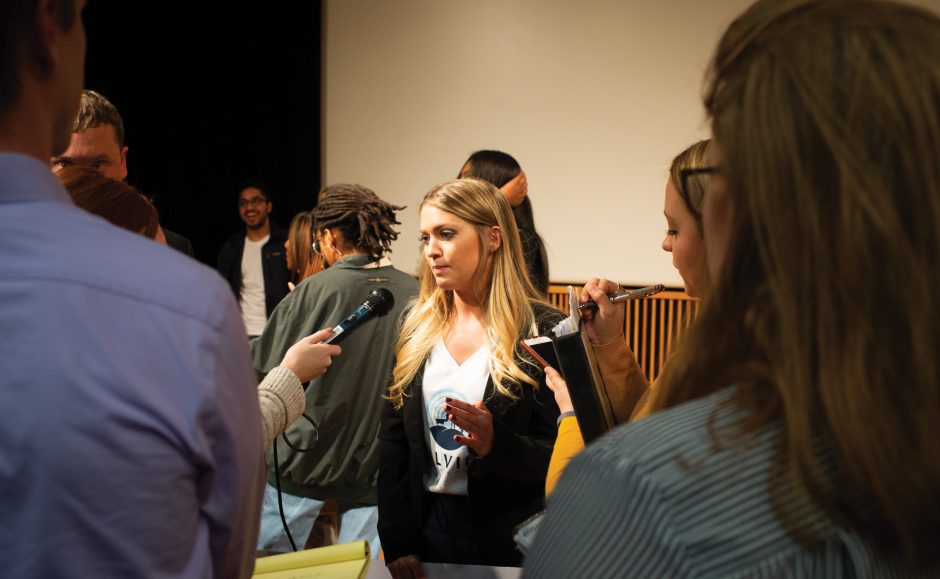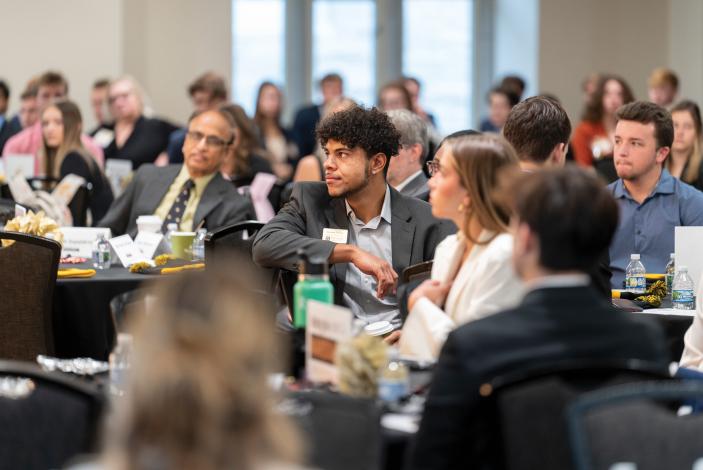
Real-world prep: Trulaske Edge’s innovative approach

By pinpointing passions and strengths, the program offers a comprehensive path toward business success.
This article originally appeared in the Winter 2024 issue of Mizzou Magazine.
From each student’s earliest days through senior year at the Trulaske College of Business, a professional development program adds layers of real-world experience and transferable skills — savvy that transcends the knowledge base of the most rigorous curriculum.
The Trulaske Edge program is a series of wide-ranging courses that frame the college experience for every student. It opens with an introduction to various paths in business, with emphasis on reflection to understand one’s best fit in the workforce. In subsequent courses, faculty mentor students as they take on semester-long projects helping companies answer key questions and, later, as they throw themselves into new settings and challenges in internships. The result is a graduate who has a habit of learning, considers their strengths and weaknesses, engages with colleagues, and contributes wherever they find themselves.
Check out the following guide to the elements of Trulaske Edge.
BA 1500 — the locator
Tim Hill, M Ed ’14, explains the introductory course succinctly to a lecture hall of up to 450 Trulaske students: “This class is all about you.” At one end of the continuum are freshmen who arrive seeming almost career ready. Others have dutifully followed a recommendation to enroll in business as a “practical degree.” Regardless, they all benefit as Hill surveys the college’s range of majors and their potential careers paths. In addition to lectures, lab groups of 25 students meet weekly with instructors to cover course material. The classes help students make connections and develop a sense of belonging at Trulaske and the broader campus, Hill says.
Another core of the course is the CliftonStrengths assessment. The college covers the cost of this evaluation, which identifies a person’s strong points and highlights areas for improvement. Then, Hill says, students divide into teams based on strengths, where, through discussion and games, they explore how to lean into their best abilities — whatever their interests.
One of Hill’s favorite course elements, the Organizational Field Experience, is a Trulaske student’s first set of formal explorations of functioning businesses. It’s typically an in-person exercise, which could include site visits, job shadowing, attending conferences and interviewing business professionals. Hill, for example, once got an email from someone in the San Francisco Giants’ front office who wanted to verify whether a student’s request to speak to the team’s CEO was legit. It was. The student nailed the interview.
The 1500 course introduces a nationally recognized set of competencies such as leadership, communication and inclusivity — skills and lessons that not only inform their student days but will also influence their working lives. (See the sidebar “A Culture of Professional Competence,” to learn more about these touchstones.)
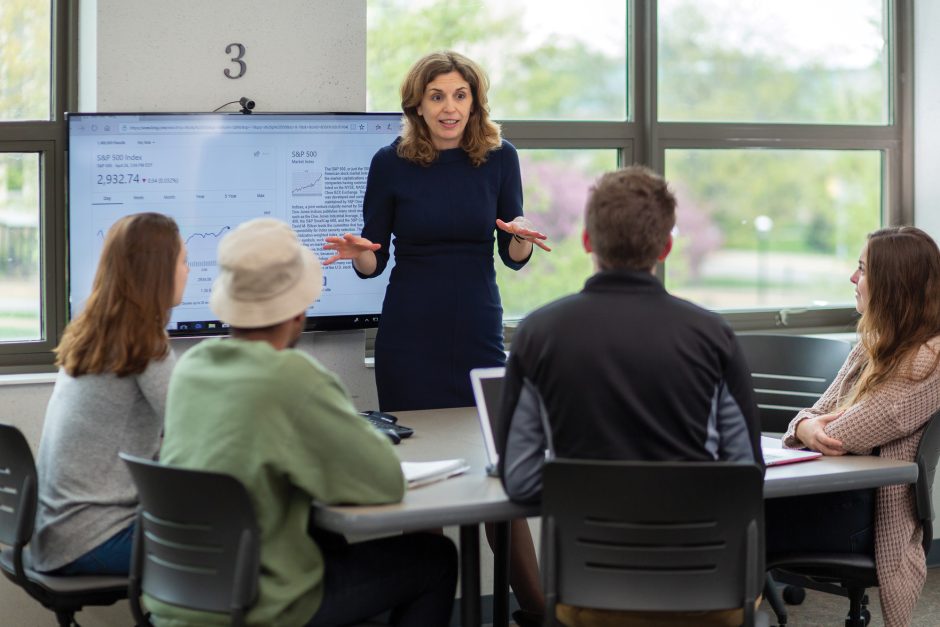
BA 3500 – service learners
Up next: a course whose major project delivers a service to businesses and a semester-long learning opportunity for students. Teams of six to eight students in upper-level courses, typically sophomores and juniors, pair with companies seeking answers to a key question.
For example, Small Town Big Deal host Jann Carl, BJ ’82, asked students to propose marketing strategies for her nationally syndicated show; Blake Hoover, BS BA ’16, asked his team to create a business development strategy for Huhtamaki, an international food packaging company; and Kaldi’s Coffee co-owner Tricia Zimmer Ferguson, BS BA ’03, tasked students with formulating an expansion strategy.
After students write resumes and cover letters applying for the job, teams meet with businesses four times, ending with a final presentation. Trulaske instructors and graduate assistants who serve as senior project managers mentor the would-be entrepreneurs as they conduct market research and other tasks, says Assistant Dean Lauren Brengarth, BJ ’03, who teaches BA 3500 and oversees the Edge program. As a graduate of the School of Journalism and a believer in the Missouri Method, she introduced a client-based project approach to the course in 2019. To place more than 100 student teams with businesses, Brengarth partnered with MU’s Office of Service-Learning, University of Missouri Extension, and Trulaske alumni and business partners.

BA 4500 – first job
The internship is a time-honored rite of passage for college students, many of whom would take most any such position to get
some experience. Although tasks such as being the office barista might build social skills, businesses taking on Trulaske interns (72% earn an average hourly wage of $17.87) agree to give them responsibilities comparable to entry-level employees with college degrees. Interns interact regularly with supervisors who are experts in the field and a team of full-time professionals at the company.
Internships can be a stretch for students, and Trulaske faculty have their back, says Cody Miller, who coordinates the course. “At times, faculty are more like career coaches,” he says. Students complete assignments and meet with faculty, but it’s about much more than getting ready for work the next day.
“We ask students to think about what they are doing, how they feel about it,” Miller continues. “‘Do you like it, or has this experience convinced you that you’d rather work in a different field?’ And we can be a safety net, helping students sort out what is acceptable, expected. Or maybe there’s a time to push back a little, all while maintaining respect. We can guide them.”
Most students intern in Missouri (68%) or nearby in Illinois, Kansas and Texas (25%), and some go overseas (5%). Settings vary widely, depending on whether students plan to work in law, nonprofits, marketing, administration or some combination of these. “We’ve placed students in Columbia’s City of Refuge working with refugees to help with things like getting into school or filling out government paperwork,” Miller says. In contrast, “We’ve had students from rural areas who want to see what it’s like to live and work in a large metro area. One of these interned at a major bank in New York City on the 30th floor of a skyscraper.”
Edge programming
Trulaske Edge lectures, assignments, field experiences and internships play out against a backdrop of opportunities to hear speakers across a range of disciplines and topics, Brengarth says.
“Edge programming allows our students to explore new concepts and supplement what they’re learning in the classroom,” says Jennifer Ward, senior coordinator. “These events give students great exposure to leaders in the community with the opportunity to network and learn directly from industry experts.”
Offerings include: Lessons from a Life Lived at 1,500 mph with Taylor Fox, BS BA ’09, fighter pilot; US-Canada-Missouri Trade Relationships with Aaron Annable, consul, foreign policy and diplomacy service, Consulate General of Canada in Chicago; Delta Gamma Lectureship in Values and Ethics with Aly Raisman, third most decorated American gymnast of all time; and Giving and Receiving Feedback with Marsh McLennan Agency.
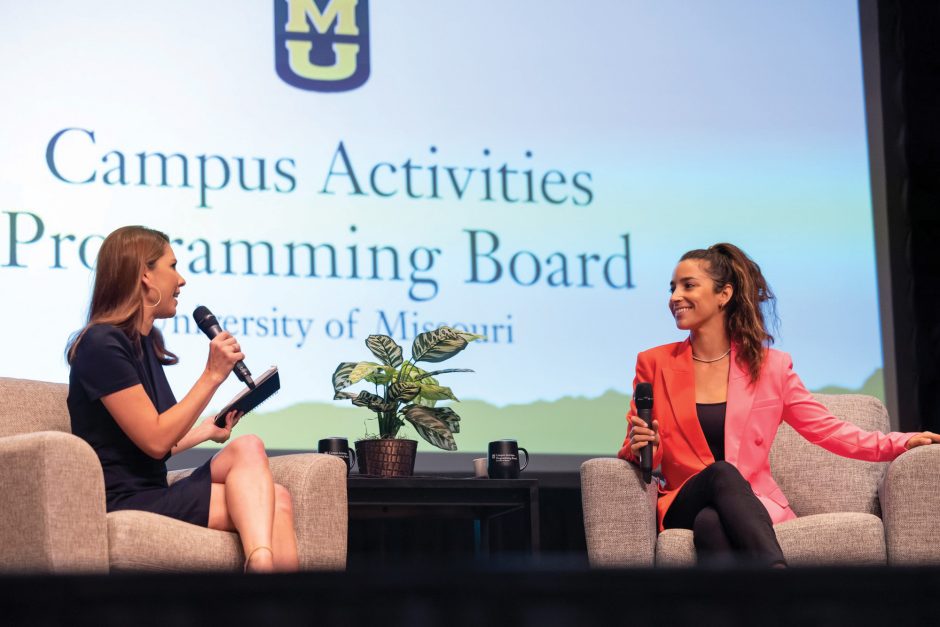
Students attend at least five hours of programs a year. The college buzzes with more than 100 such Edge programming events every semester from speakers, including faculty, alumni, representatives of numerous companies and conference presenters.
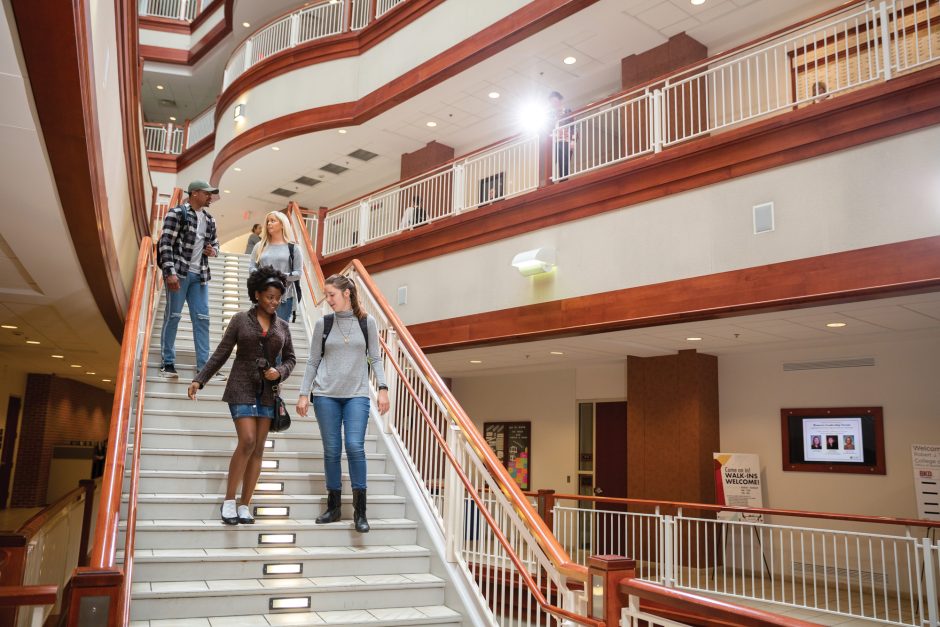
A Culture of Professional Competence
Every student’s roadmap through a Trulaske education comes equipped with a compass — a set of nationally recognized competencies embedded into its curriculum and programming. The competencies condensed below combine those of the National Association of Colleges and Employers with those of Trulaske faculty and alumni.
Communication: Articulates ideas, whether technical or emotional, orally and in writing, to varied audiences in appropriate detail. Knows one’s audience, when to speak and when to remain silent.
Leadership: Uses interpersonal skills cultivating others’ strengths to achieve goals. Builds a sense of belonging. Influences others in support of an agenda. Maintains communication across individuals and groups.
Critical thinking: Employs sound reasoning to analyze issues, solve problems and make decisions. Acquires and uses knowledge, sometimes in creative ways. Knows when to rely on analysis or go with one’s instinct.
Teamwork: Builds collaborative relationships across cultures, demographics and viewpoints.
Sacrifices for others, and relishes shared responsibilities and rewards. Handles difficult situations and people with grace.
Career and self-development: Knows one’s strengths and how to achieve goals. Motivated by an internal drive to succeed. Understands and modulates emotions at stressful moments.
Professionalism: Behaves ethically, with integrity and a strong work ethic. Understands verbal and nonverbal communication. Does what one says.
Technology: Uses technology ethically and efficiently to accomplish goals. Is a lifelong learner who focuses daily on key objectives, and reflects on experiences both successful and unsuccessful.
More on Trulaske Edge: business.missouri.edu/edge
